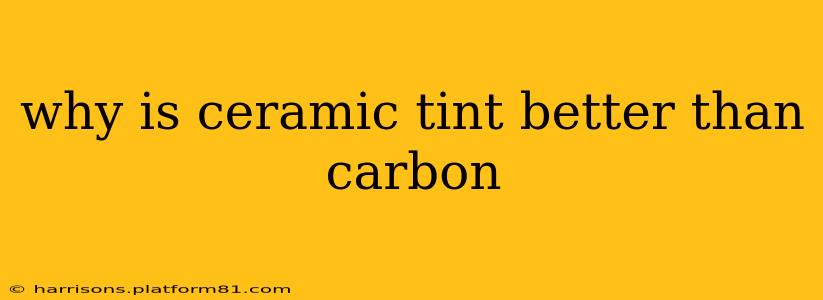Choosing the right window tint for your car or home can feel overwhelming. With so many options available, understanding the differences between popular types, like ceramic and carbon, is crucial. While both offer UV protection and heat reduction, ceramic tint often emerges as the superior choice for several key reasons. This in-depth comparison explores those advantages, addressing common questions and misconceptions.
What are the Key Differences Between Ceramic and Carbon Window Tint?
Ceramic and carbon films both aim to block solar heat and UV rays, improving comfort and protecting interiors. However, they achieve this through different methods. Carbon films use a layer of carbon particles to absorb solar energy, while ceramic films utilize microscopic ceramic particles that reflect heat and UV radiation. This fundamental difference leads to significant variations in performance and longevity.
Is Ceramic Tint More Expensive Than Carbon?
Yes, generally ceramic tint is more expensive than carbon tint. This price difference stems from the more complex manufacturing process involved in producing high-quality ceramic films. The superior performance and longevity, however, often justify the higher initial cost in the long run.
Does Ceramic Tint Block More Heat Than Carbon?
While both options offer substantial heat reduction, ceramic tint often provides superior heat rejection. Carbon films primarily absorb heat, which can lead to the film itself getting hot and potentially causing premature fading or damage. Ceramic films, on the other hand, reflect heat away from the glass, keeping the film and the interior cooler and more comfortable.
How Does Ceramic Tint Compare to Carbon in Terms of Clarity and Appearance?
Many people find that ceramic tint offers superior clarity and a more natural look. Carbon films can sometimes have a slightly darker or more noticeable appearance, especially in darker shades. Ceramic films tend to maintain a clearer view, reducing distortion and enhancing visibility.
Which Tint Offers Better UV Protection: Ceramic or Carbon?
Both ceramic and carbon tints offer excellent UV protection, typically blocking 99% of harmful UV-A and UV-B rays. However, the superior heat rejection of ceramic tint often leads to less overall interior fading, further protecting your car's upholstery and other interior components.
Which Lasts Longer: Ceramic or Carbon Tint?
Ceramic tint generally boasts a longer lifespan than carbon tint. The reflective nature of ceramic particles means they're less likely to break down or degrade over time due to heat absorption. Carbon films, prone to heat absorption, may fade or become less effective sooner.
What are the Disadvantages of Carbon Tint?
The primary disadvantages of carbon tint include its tendency to absorb heat, which can lead to premature aging and fading of the film itself. It can also generate more heat buildup within the film, potentially affecting its longevity and performance. Further, the appearance might not be as clear as ceramic tint.
What about the signal interference of ceramic tint?
A common concern with any window tint is the potential for interference with radio signals, GPS, or cellular data. High-quality ceramic tints are designed to minimize this interference, though the specific impact can vary depending on the tint's composition and the thickness of the film. Modern, well-engineered ceramic tints generally perform very well in this area.
Conclusion: Why Ceramic Often Wins
While carbon films offer decent heat and UV protection at a lower price point, ceramic window tint often emerges as the superior choice for its superior heat rejection, clarity, longevity, and overall better performance. The higher initial investment pays off in the long run through extended lifespan and improved comfort. Weighing the long-term benefits against the initial cost is essential for making an informed decision. Consider your individual needs and budget to determine the best window tint for your specific situation.
